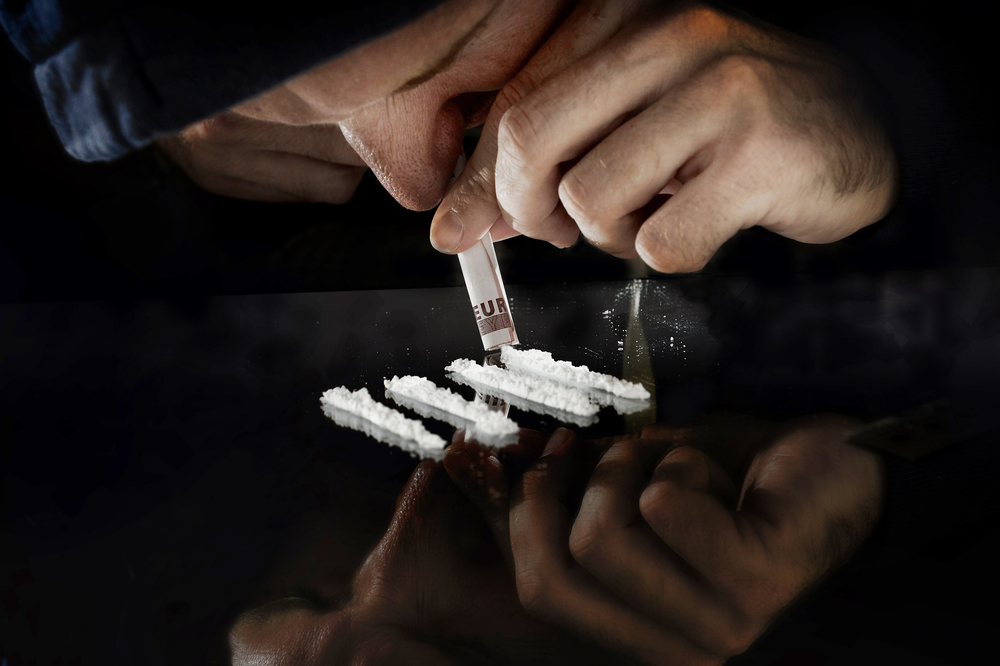Last Updated:
June 9th, 2025
Between 62% and 90% of people who abuse cocaine also drink alcohol, often combining the two without fully understanding the risks. When used together, these substances create a third compound in the body that’s even more toxic.
In this help guide, we’ll be taking a closer look at just how harmful the combination of cocaine and alcohol can be, both physically and psychologically and why it deserves serious attention.

Why would someone want to take cocaine and alcohol together?
If you’re aware of what types of drugs cocaine and alcohol are, you might find it confusing that people mix them. One’s a stimulant that speeds everything up. The other’s a depressant that slows things down. Put together, it sounds like they’d cancel each other out, right? Well, in theory, that would make sense. But when you look at how the body reacts to both substances together, you start to see why the combination is so common.
Cocaine gives users a burst of energy, confidence and alertness, while alcohol tends to make people feel more relaxed and sociable. So when taken together, alcohol can take the edge off the jittery high of cocaine, while cocaine can make a drinker feel sharper and less drowsy. The result is a mix that can feel, at least in the moment, like the best of both worlds.
But what is actually causing this to happen?
What is cocaethylene?
When alcohol and cocaine are taken together, the body produces a third substance called cocaethylene, a unique psychoactive compound formed in the liver. Unlike typical drug interactions, this is a new drug created entirely inside the body.
Cocaethylene behaves much like cocaine, blocking dopamine reuptake in the brain and creating a more intense, longer-lasting high. However, this extended euphoria comes at a cost:
- Cocaethylene is more toxic than cocaine, especially to the heart
- It increases the risk of heart attack, irregular heartbeat and sudden death
- Its longer half-life means it stays in the body longer, extending the danger
While research is still limited, what we do know points to cocaethylene as a highly dangerous compound that significantly raises the risks of using cocaine and alcohol together.
Can you become addicted to Cocaethylene?
Cocaethylene isn’t something people typically set out to take, but that doesn’t mean it can’t become a problem. While many are unaware of cocaethylene’s role, its presence can significantly increase the risk of addiction.
Longer-lasting effects reinforce the habit
Cocaethylene has a half-life of around 2.5 hours, almost four times longer than that of cocaine. This extended duration means it lingers in the body, prolonging feelings of energy and euphoria. These longer highs can be more appealing than the short-lived effects of cocaine alone, subtly encouraging repeat use of the combination.
Its slow clearance and ability to be stored in body tissues may increase the chances of it being psychologically reinforcing. Over time, some people begin chasing this specific high, not necessarily the feeling from cocaine or alcohol alone, but the enhanced, drawn-out rush that cocaethylene provides.
More than just a stronger high
Despite being at serotonin receptors, cocaethylene has longer-lasting effects on dopamine levels and psychomotor activity, both of which are linked to addiction. These effects, combined with the physical stimulation from alcohol and cocaine use, make the combination particularly habit-forming.
Studies show that people who mix crack cocaine with alcohol experience more intense euphoric effects, along with noticeable increases in heart rate, blood pressure and overall stimulation. These physiological boosts can make the mix feel especially powerful, despite its harmful consequences.
A hidden driver of dependency
Cocaethylene itself may not be a household name but its presence plays a critical role in sustaining the cycle of cocaine and alcohol use. The blend evolves into a pattern where people are no longer chasing either substance individually but the unique and dangerous high that emerges when they’re combined.

Can you become addicted to alcohol and cocaine separately?
While many people who use alcohol and cocaine together become accustomed to the combined high, some can develop a separate addiction to one or the other. The relationship between the two drugs is complex, but when used regularly, either can cause dependency on its own, even if they were initially used together.
When cocaine becomes a problem on its own
Imagine someone who originally only used cocaine on weekends when drinking heavily at parties. Over time, they find themselves craving that rush outside of social settings. Maybe they begin using it during the week for energy to get through work, then to feel normal. The alcohol is no longer required to prompt the habit. The brain has locked into the pattern of wanting the sharp focus, euphoria and stimulation that cocaine brings.
This kind of progression isn’t unusual. Cocaine can become a reward system. Even if someone quits drinking, they might continue using cocaine to chase the confidence or energy it once gave them in social settings. But over time, what started as an enhancement becomes dependence. Sleep suffers, irritability rises, and relationships and routines begin to unravel. All signs that cocaine is no longer an occasional add-on but the main event.
When alcohol becomes a problem on its own
On the flip side, someone might first use alcohol to help come down after using cocaine. Eventually, they start relying on it more frequently. After work, I unwind, socialise on the weekends, or even alone during the day when stress builds. What makes alcohol tricky is how socially accepted and accessible it is. Unlike cocaine, which is expensive and illegal, alcohol can be bought at the corner shop and consumed without raising suspicion.
Even if they stop using cocaine, the drinking might remain. It may have started as a counterbalance to cocaine’s intensity, but now it’s a coping mechanism. Their body builds a tolerance and needs more to get the same effect. Soon enough, alcohol is needed to feel OK and going without causes shakes, sweats or anxiety. If this has happened, it’s clear the dependence has taken hold.
I feel as though my cocaine and alcohol usage is out of control. What can I do?
If your cocaine and alcohol use feels out of control, you’re not alone, and you don’t have to face this on your own. Addiction Helper is here to guide you through the next steps, whether that means understanding your options, speaking to someone who truly listens or finding a rehab programme that suits your needs. We’ve helped thousands take back control of their lives, and we can help you too.
Call our free 24/7 helpline today for confidential advice, support and the guidance you need to start your recovery journey.
Frequently Asked Questions
(Click here to see works cited)
- “Cocaethylene.” Cocaethylene – an Overview | ScienceDirect Topics, www.sciencedirect.com/topics/medicine-and-dentistry/cocaethylene. Accessed 12 May 2025.
- Pergolizzi J, Breve F, Magnusson P, LeQuang JAK, Varrassi G. Cocaethylene: When Cocaine and Alcohol Are Taken Together. Cureus. 2022 Feb 22;14(2):e22498. doi: 10.7759/cureus.22498. PMID: 35345678; PMCID: PMC8956485.
- “Cocaethylene.” Cocaethylene – an Overview | ScienceDirect Topics, www.sciencedirect.com/topics/neuroscience/cocaethylene. Accessed 12 May 2025.

